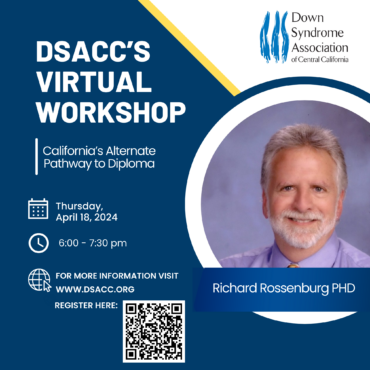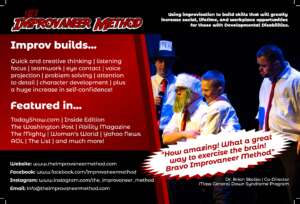Our Workshops
Conferences
A large conference with nationally known speakers is typically scheduled bi-annually. Conferences have focused on social issues, healthcare, behavioral issues, sexuality, abuse prevention, estate planning and education techniques.
We are devoted to providing pertinent educational opportunities that empower our membership and community to become better educated about people with Down syndrome, the challenges they face, and how to help these individuals achieve their life goals.
Smaller Scale Workshops and Talks
Periodically, we schedule smaller scale workshops and programs that cover topics related to Down syndrome in the areas of parenting, education, healthcare, recreation, therapies, self advocacy, sibling issues, behavior, and life planning to name a few.
More Programs
Virtual Workshops
California's Alternate Pathway to a Diploma
- Thursday, April 18, 2024
- from 6:00-7:30 pm
- cost: FREE!

 IMPROVANEERS
IMPROVANEERS
The Improvaneer Method uses improvisation to build skills in individuals with developmental disabilities that will greatly increase social, workplace, and lifetime opportunities. The program is an action-packed, super fun, amazing opportunity for any friend with a developmental disability.
- TEAM WORK
- LISTENING
- FOCUS
- SELF CONFIDENCE
- PROBLEM SOLVING
- QUICK THINKING
- ADAPTING TO CHANGE
All instruction during this program involves games, interaction, and improvisation designed to build the skills listed above.
This is a 5 week session that meets every Monday and Wednesday each week from 4:30-5:45pm at the DSACC Office.
- April 17, 22, 24, 29 May 1, 6, 8, 14, 15, 20
- Cost is $250 per person (Scholarships available, just contact DSACC staff to apply for one!)
- Register TODAY!
OUR MISSION
To enhance the quality of life for all people whose lives are touched by Down syndrome.
OUR VISION
We envision a community that demonstrates acceptance, inclusion and appreciation for those who have Down syndrome.
